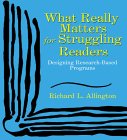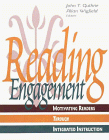 Ask the Literacy Teacher
Ask the Literacy Teacher
by Leigh Hall
Introduction
(the first article follows the Introduction)
The idea that we are all teachers of literacy regardless of our subject area or grade level is nothing new. Many of us have most likely experienced frustration as we met children who could not do the reading and writing tasks that the schools demanded of them. The frustration only increased as we began to realize that we did not always know the best way to help these children learn the necessary content while becoming better readers and writers in the process. This column seeks to help alleviate some of that frustration.
As a former middle school teacher of language arts and social studies I experienced these problems daily. My background in elementary education allowed me to draw on and apply what I had learned about reading and writing to my own situation. Now, as a doctoral student in the field of literacy, I have been able to study this issue more closely and have begun to understand how research is and can be relevant to the questions I raised as a teacher.
The purpose of this column is to help you, the classroom teacher, begin to find new ways to help your struggling readers and writers improve their abilities. This column seeks to be both researched based while remaining practical. This means that you will be able to see how theories and ideas about reading and writing connect with the suggested strategies to be implemented. References will always be provided in the form of journal articles and books so that you can always read more if you desire.
Questions for this column that pertain to the teaching of reading and writing are welcomed. Questions in this area that deal with students performing below grade level, are not native speakers of English or who have learning disabilities are strongly encouraged. In addition, teachers from all subject areas and grade levels should feel free to submit their questions. This column is meant to help us all think about how we use reading and writing in our classrooms and is not meant to be exclusive to elementary teachers or to reading and language arts teachers.
Please submit your questions to: leighhall@teachers.net
Dear Literacy Teacher,
How do you help sixth grade students who are at a third grade reading level?
Sincerely,
An Intern
Dear Intern,
This type of problem may be more common than you think. You've already made a step in the right direction by acknowledging that it exists. The next important thing would be to determine what their strengths and weaknesses are. This will require some assessment on your part. You might want to consider the book, "35 Must-Have Assessment & Record-Keeping Forms for Reading (Grades 4-8)," by Laura Robb. This will give you some detailed advice for getting started in this arena.
Once you have determined what their specific needs are then you can design instruction that meets those needs. One way to do this is by organizing small groups of students together and having a mini-lesson on a particular topic. For example, students who need help on stating the main idea of an article might work in a small group together around this topic while students who did not need this help would be working on something else. These are not ability groups. Each time you work with a small group on a particular reading topic the groups will change and shift according to who needs the instruction. There should still be times when whole class instruction is still given. For more information on mini-lessons see the book, "Language Arts Mini-Lessons," by Joan Clemmons and Lois Laase.
The situation you have described is a very complicated one and the answer I have given you is very general. Should you need more specific information please feel free to write back. Thanks.
Dear Literacy Teacher,
How would you respond to students who tell you that they hate reading?
Middle School Teacher
Dear Middle School Teacher,
It has been my experience that students who can read well generally love to read (though no one likes everything) and that students who struggle to read will resist it. Some people might argue that you need to motivate these students to read more and to some degree that may be true. However, I would stress that you not respond to this by implementing a reward system for reading as it usually is not successful with these students (see, "Punished by Rewards," by Alfie Kohn for more on this).
Instead I would first determine why students are saying this to you. Can they read and comprehend the material you are asking them to read? Do they enjoy the topics you are asking them to read about? Some students may tell you they hate reading when what they mean is that they hate reading things in the area of science or social studies. Others may use it as an attempt to hide the fact that they cannot read well.
If you determine that these students cannot read the material then you will need to do an assessment to determine where they are. See my response to the first writer for a more detailed answer on this. If they can read but choose not to then you may need to consider several things. First determine if there are other reading materials that may be more interesting to the student. If the reading curriculum is flexible then you might want to allow them to choose their own materials with your guidance. Another idea is to address the topic openly with the student. Acknowledge their feelings about reading and let them know it's ok not to like everything they read. Provide them with an explanation of why they need to read the material and how it will benefit them both in the classroom and beyond into their life. These techniques can help motivate the students while allowing them to see the usefulness of what they are doing in school.
Book Recommendations for the Month:

What Really Matters for Struggling Readers (2001)
by Richard L. Allington

Reading Engagement: Motivating Readers Through Integrated Instruction (1997)
by John T. Guthrie

Struggling Adolescent Readers (2000)
by David Moore
Web Links:
Train Your Brain to Read Bookmark:
http://www.miamisci.org/tec/bookmark.html
KWLH Technique:
http://www.ncrel.org/sdrs/areas/
issues/students/learning/lr1kwlh.htm
The Main Idea Lesson Plan:
http://www.edventure.com.au/static/
teachers/resource/idea.asp
| 
